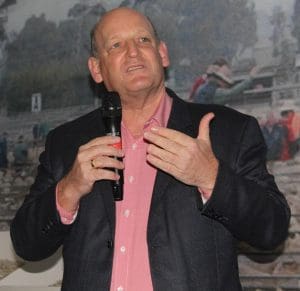
Elders CEO Mark Allison at Sheepvention.
ELDERS chief executive officer Mark Allison issued a challenge to Australia’s rural development corporations to achieve more with their levy dollars and government contributions, at Hamilton’s Sheepvention this week.
Mr Allison told the company’s wool grower clients that Australian agriculture was in a perfect position with its proximity to great markets in China and south-east Asia, but he was concerned that to maintain its competitiveness, the sector needed internationally competitive infrastructure.
Mr Allison said he watches current affairs programs talking about same sex marriage and immigration as the critical issues facing Australia.
“I think the key issues for us from a national view point, from an Australian economy view point, aren’t those issues.
“The key issues are around having internationally competitive infrastructure, having the prioritisation and focus of our research, development and extension dollars in exactly the right spots so that we continue to innovate and continue to grow.”
Mr Allison said having a continually favourable environment for young people to come through in rural Australia was also important.
“And I think the final issue that I see is the breakdown in empathy for rural and regional Australia in the cities.”
Click here to get the latest Sheep Central story links sent to your email inbox.
Mr Allison said some of the data he has seen showed that most people once had some connection to agriculture, and to rural and regional Australia.
“Today 75 percent of people in capital cities have no link – so the link is broken – and that’s why we get some of the nonsense we hear on multiple issues, whether it be GM, animal welfare, or whether it be sustainability or environmental commitment.
“Clearly our industries, our people, you, me, are committed to the best animal welfare, that’s part of the thing we love about our job – the livestock, the animals and looking after the environmental landscape that we’re in,” he said.
“So I think they are the big challenges.”
Why hasn’t our productivity improved?
Mr Allison said Elders is investing heavily in innovation, new technology, in a number of initiatives through partnerships with “key players” that would drive productivity through multiple industries.
After his Sheepvention presentation, Mr Allison told Sheep Central real agricultural productivity has basically been flat since the late 1990’s.
“Up in some areas, down in others, but basically flat.
“The question that we’ve been asking and we’ve been investing a lot of time is around productivity – real productivity – and the biggest part in that is the partnership investments with research and development, and extension,” he said.
Mr Allison said although Horticulture Innovation Australia, Meat & Livestock Australia, the Grains Research and Development Corporation and AWI have sophisticated well-thought out through plans “I wonder if we can do better in the prioritisation.”
“Why hasn’t our productivity improved?
“It begs the question, but where is the national plan – not by commodities – because we have national plans mostly by commodities.
“Where is the national plan for prioritisation, because most of the plans are matched to government funds?”
Mr Allison believed the current AWI-MLA differences over consumer engagement on animal welfare were “around the edges,” compared to the main issues of productivity, prioritisation of RD&E spend, investment in infrastructure and re-nurturing an empathy in metropolitan Australia for regional rural Australia.
But he said the “absolute fragmentation” of Australian agriculture’s grower groups was a critical issue, including in grain and wool.
“At a point in time when are so well-positioned and when our outlook is so positive – then must be the point in time to say ‘you know what, let’s focus on these big issues in order to get one position.”
Loyal Elders clients thanked
Mr Allison said he last spoke at Sheepvention three years ago while Elders was being “relaunched” as a “pure plain agribusiness.”
“Elders at that stage was a $50 million market cap company and the object of an aggressive takeover by competitor Ruralco, with a market cap of around $300 million.
“So we turn the clock forward to 2017 and Elders is an upto $600 million market cap company ($561 m this week) and Ruralco is still around 300 million ($311m this week), and we’ve been able to get rid of all of our term debt to get us in a very strong position from a balance sheet view point, which allows us to reinvest across the industry,” he said.
“One of the comments I made back then was how appreciative we’ve all been, the board and management of Elders, for the support of Elders clients in our deepest darkest time.
“Now that we’ve come out of that we are looking forward to being able to re-invest in a number of different ways to assist you to run sustainable and more profitable businesses,” Mr Allison said.
“Thank you for your support.”
Mr Allison said he parallels Elders with the good and bad times of Australian agriculture generally and the wool industry.
“We are now back into good times and we are looking forward to making best of them.”

HAVE YOUR SAY